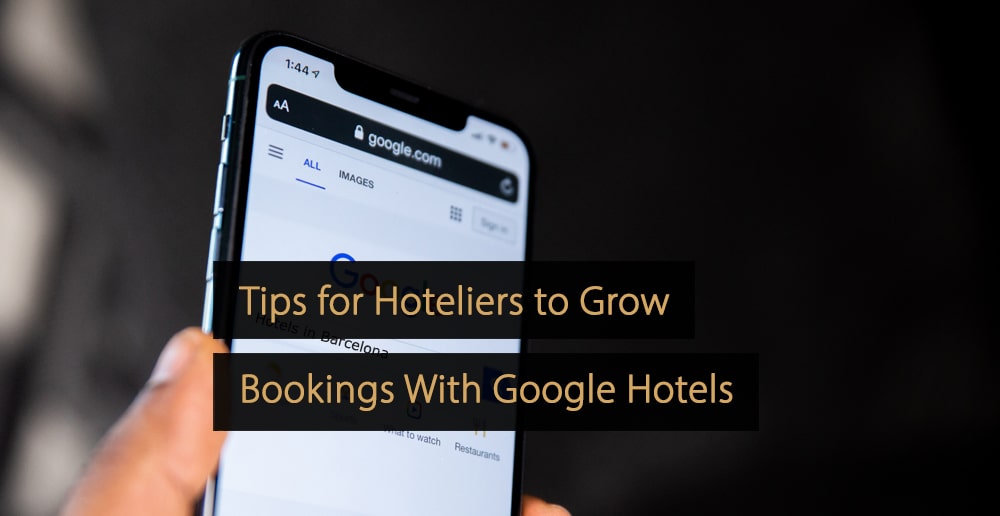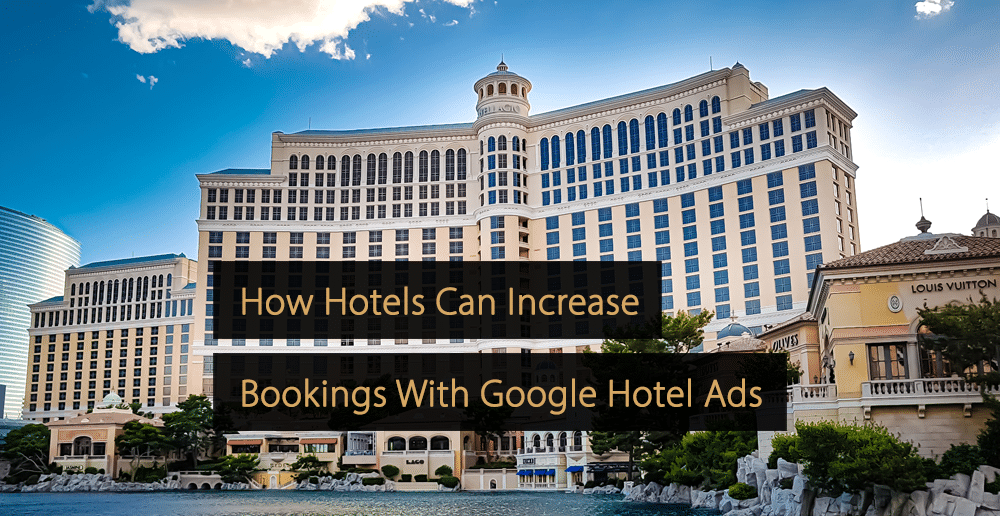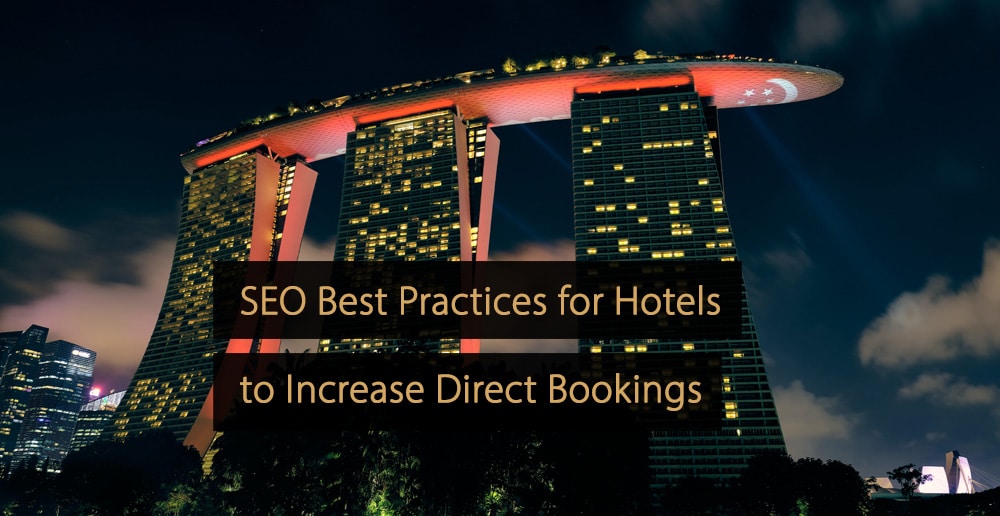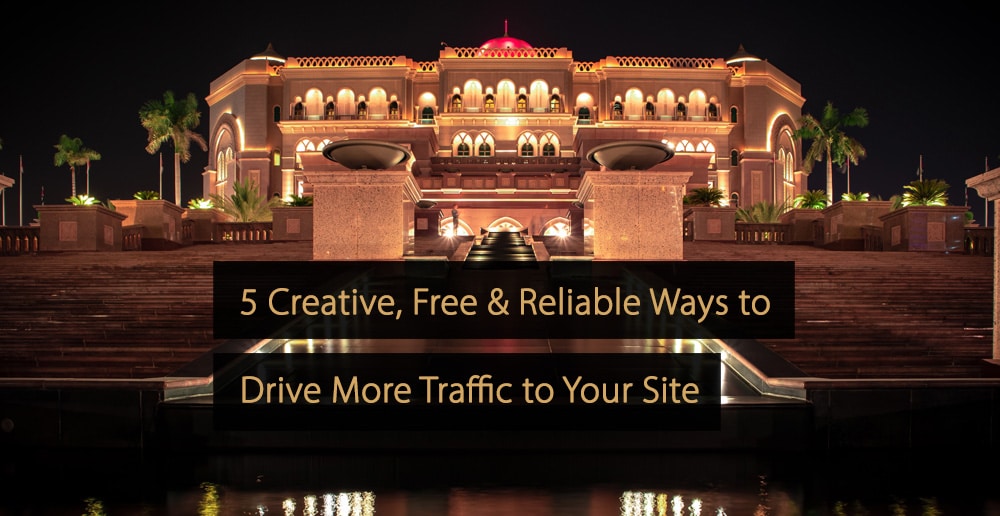Business growth and revenue management are top priorities for most hotel owners, and these concepts rely heavily on optimizing demand for hotel rooms. One of the ways hotels can do this is through the Google Hotels platform. In this article, you can find details on how this works and the main benefits.
Table of Contents:
- What is Google Hotels?
- How Does Google Hotels Work?
- How Hoteliers Can Grow Their Bookings With Google Hotels
- What is the Difference Between Google Hotels and OTAs?
- What Are the Advantages of Google Hotel for Hoteliers?
- How is Your Hotel Showcased in Google Hotels?
- What Are the Costs for Hoteliers Selling Rooms via Google Hotels?
- Video: How Consumers Use Google Hotels?
- Video: How to Use Google Hotel Ads to Increase Direct Bookings
- How to Become a Google Hotels Partner
- Reviews on the Google Hotels Service
- Understanding Google Travel Insights
- SEO Tips to Boost Performance Using Google Hotels
What is Google Hotels?
Google Hotels is a hotel metasearch engine that forms part of the wider Google search engine. It allows customers to search for and book hotels online and allows those involved in hotel management to increase visibility and attract more bookings. The service was originally launched in 2011 and was initially known as Google Hotel Finder.
Aside from its core functionality of helping users to find and book hotel rooms, Google Hotels is also valuable as a room rate comparison tool and a review platform. It will allow potential customers to compare feedback, prices for hotels, and even prices on different platforms selling the same hotel rooms.
How Does Google Hotels Work?
The Google Hotels service can present users with information about all of the hotels that Google is aware of. This awareness could come about due to online travel agents (OTAs), other hotel metasearch engines, professional relationships between the hotel and Google, paid advertisements, and more.
Examples of the type of information presented include hotel descriptions, reviews, location data, and price information. Google Hotels also allows users to book rooms directly through the platform, meaning potential hotel customers never need to leave Google. This results in a greatly streamlined booking process.
With that being said, Google Hotels also provides links to other platforms, including hotel websites and OTAs.
How Hoteliers Can Grow Their Bookings With Google Hotels
For many travelers, Google represents the first destination for travel bookings because it allows instant price comparisons and booking hotels, airline tickets, and more. With this in mind, it makes sense for those involved with hotel marketing to capitalize on the platform’s popularity to enhance hotel visibility.
While those within the hotel industry tend to favor direct bookings because the hotel retains more of the money the customer spends, it is a reality that the hotel industry increasingly relies on third-party services. These third parties can help to generate bookings because customers discover hotels through them.
Google Hotels uniquely offers benefits associated with third parties while boosting direct bookings.
What is the Difference Between Google Hotels and OTAs?
Online travel agents, or OTAs, sell services to companies in the travel industry, including hotels. In the process, they will take a commission fee, usually a percentage of the customer’s pay. As a result, while they have a clear role in your hotel marketing strategy, they can be expensive to rely on.
By contrast, Google Hotels is a metasearch engine that searches other platforms, including OTAs, and shows availability information and the various room rates. In addition to this, hotels also have the opportunity to use Google Hotels to showcase their property, advertise rates and availability, and attract direct bookings.
What Are the Advantages of Google Hotel for Hoteliers?
In this section, you will be able to find out about some of the key advantages of using Google Hotels for those in the
1. Capture Customers Seeking a Hotel in Your Area
One of the big advantages of Google Hotels is the ability to attract and convert customers who are specifically seeking hotels in your area. This is important because many Google users do not have a specific hotel in mind when they begin their search, and they are seeking only the best available option in the location of their choice.
The results displayed when users enter a relevant search term will provide your hotel’s name, along with room rates, location details, reviews, and other information that can help attract bookings.
2. Generate a Higher Number of Direct Bookings
Another crucial benefit of using Google Hotels is the ability to compete with OTAs for visibility in Google search results while also linking customers directly to your hotel’s website and/or booking engine. Without this, customers would be more likely to book through those OTAs instead of going directly.
This is significant because direct bookings allow hotels to retain more money customers spend on the booking. After all, OTAs take a fairly large commission – sometimes exceeding 20 percent. If your hotel is not connected to any OTAs, Google Hotels helps ensure you have a presence on search engine results pages.
3. Access to Important Customer Information
While Google’s service essentially links the customer and the hotel, many bookings generated through Google Hotels are eventually made directly. As a result, when you generate bookings, you can gain access to valuable customer information, including contact details and demographic data.
When bookings are made through other third parties, they often gain ownership of the customer information instead. Such information is valuable for pre-arrival customer service, and the customer information can equally be used as part of a wider data collection strategy so that the data can inform future business decisions.
4. Ownership of the Entire Customer Journey
In addition to gaining valuable customer information, another plus point associated with using Google Hotels is the opportunity to own the entire customer journey from start to finish.
This can be important for several reasons, but one of the most significant relates to pre-arrival communication. Suppose a hotel has ownership of the entire journey. In that case, they can more easily communicate hotel policies with those who book and identify opportunities for up-selling and cross-selling, which is vital for optimizing revenue.
5. Showcasing Your Entire Property Offering
Finally, one of the major advantages of using Google Hotels to grow bookings is the ability to showcase your entire property offering. You can define different room types through features like Google Room Bundles, while your channel on the platform can include high-resolution photographs of each type.
Information can also be included about your room rates, your hotel’s cancellation policy, the food offerings – including room service and restaurants – your hotel’s bar, and any additional facilities or services, such as leisure facilities, pools, parking, wi-fi, and access to public transport hubs. Highlighting your entire offering allows those using the Google Hotels platform to gain a clear sense of your hotel and the experience you can provide them with during their stay.
How is Your Hotel Showcased in Google Hotels?
When you connect your hotel to the Google Hotels service, your hotel will be showcased in several ways. You can find out more about these below:
In Search Results
The first and perhaps most obvious place your Google hotel ads will be displayed is within search engine result pages. Your hotel information and booking options will be shown to users who enter relevant search terms, such as those searching for hotels with your name or hotels close to your location.
In Google Maps
Google Hotels will also display your hotel information within the Google Maps platform. This can be vital because many travelers use Google Maps ahead of their trip to get a clear sense of local attractions, local facilities, and nearby hotels. From the Maps interface, users are also able to book rooms directly.
In Google Assistant
Google Assistant is the name of Google’s AI-powered virtual assistant. It is found on smartphones, smart hubs, and other similar devices and allows hotels to reach users using voice search to find hotels. Furthermore, Google Assistant allows for bookings to be completed entirely through voice commands.
In Google Hotel Search
Finally, hotel ads will be displayed when users visit the dedicated Google Hotels website (Google.com/travel/hotels) and conduct a relevant search. This is useful because these users have very clear intent with their searches and are among the most likely to complete a booking.
What Are the Costs for Hoteliers Selling Rooms via Google Hotels?
Google Hotels works according to a bidding model, with hotels selecting their strategy and deciding how much they will pay to display hotel information to users who have carried out a relevant search. One of the most popular options here is cost-per-click (CPC), where the hotel pays for each click generated by their advertisement.
The CPC model includes options for a fixed amount to be paid per click or a more flexible approach, where bids are automatically adjusted based on the likelihood of attracting a booking. An alternative to CPC is to pay Google on a commission basis, and this can be set up so that you pay per commission per booking or guest stay.
Essentially, this means you will have a choice between paying out a percentage of the booking fee the customer pays or paying a set amount of your own money each time one of your ads is clicked.
Video: How Consumers Use Google Hotels?
In this video, you will learn how consumers use Google Hotels to search and find hotels.
Video: How to Use Google Hotel Ads to Increase Direct Bookings
In this video, hoteliers will learn how to Use Google Hotels Ads and increase their direct bookings.
How to Become a Google Hotels Partner
Hotels have two main options for becoming a Google Hotels partner: connect availability information and room rates to the service directly, or find and work with an official connectivity partner or channel manager.
The first option will require creating and maintaining an account with the Google Hotel Center. From there, you should be able to connect availability and pricing information and link your new account to your Google Ads account.
Working with a connectivity partner circumvents much of this hassle, as everything will be handled for you. However, the downside is that this option will cost more, and it could be prohibitively expensive for smaller hotels.
Reviews on the Google Hotels Service
The Google platform allows users to leave reviews for many business types, and hotels are no different. Google Hotels will display these reviews to users, enabling them to understand what customers think about your hotel. Crucially, the platform has been configured to detect and remove reviews that appear to be spam.
Reviews can be extremely influential, and many potential guests make their booking decisions based on the feedback they see. Read the “9 Tips to Manage Online Hotel Reviews” article to learn how to manage your reviews.
Understanding Google Travel Insights
Aside from Google Hotels, various other Google services can benefit those in the travel and tourism industry, and a good example of this can be seen with Google Travel Insights. This particular service provides access to key performance and industry data, with examples including demand for travel and emerging booking trends.
You can learn more about Google Travel Insights, including a breakdown of the three major components of the service, by reading the “Google Travel Insights: Tools & Data Trends for The Travel Industry” article.
SEO Tips to Boost Performance Using Google Hotels
Search engine optimization is one of the most important strategies when using Google Hotels – and the Google platform in general. Essentially, this is the process of optimizing content to boost its chances of ranking high up in Google search results, and it can involve techniques like keyword placement, link building, and content creation.
You can learn more about search engine optimization, how it works, and some of the techniques you can use to boost your hotel’s rankings by reading “5 SEO Tips for Hotels to Improve your Ranking in Google”.
Google Hotels forms one part of Google’s much larger global offering and has become extremely well-regarded within the travel and tourism sector. By fully capitalizing on what the platform has to offer, hotels have the potential to improve online visibility, attract direct bookings, and grow their business.
More Tips to Grow Your Business
Revfine.com is the leading knowledge platform for the hospitality and travel industry. Professionals use our insights, strategies, and actionable tips to get inspired, optimize revenue, innovate processes, and improve customer experience.Explore expert advice on management, marketing, revenue management, operations, software, and technology in our dedicated Hotel, Hospitality, and Travel & Tourism categories.
This article is written by:
Hi, I am Martijn Barten, founder of Revfine.com. With 20 years of experience in the hospitality industry, I specialize in optimizing revenue by combining revenue management with marketing strategies. I have successfully developed, implemented, and managed revenue management and marketing strategies for individual properties and multi-property portfolios.









I came here from Google SERP, before reading this blog I didn’t know anything about Google hotels. Thank you for explaining it in details. I learned a lot from your article. I am definitely going to share this with my network so that they can also benefit from it.